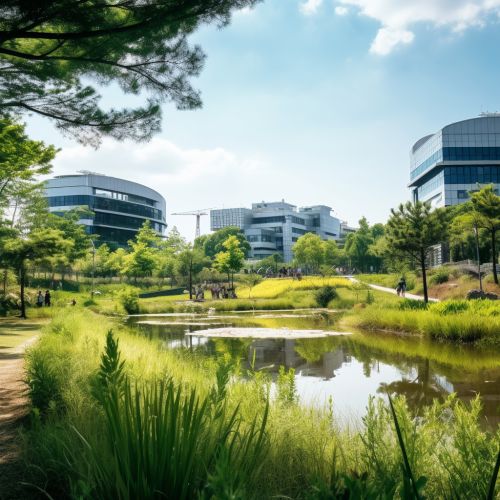KAIST
History
The KAIST was established by the Korean government in 1971 as the nation's first research-oriented science and engineering institution. The institute was founded with the mission to foster elite human resources in science and technology needed for the nation's future development. The government and a group of dedicated scientists envisioned a school that would develop a workforce of highly trained scientists and engineers to support Korea's drive for rapid modernization.


Academics
KAIST comprises of five colleges: Natural Sciences, Life Science and Bioengineering, Engineering, Information Science and Technology, and Cultural Science. Each college is further divided into departments and divisions that cover a wide range of major academic disciplines. These include traditional disciplines such as physics, chemistry, and biology, as well as unique interdisciplinary programs such as the Graduate School of Innovation and Technology Management.
Natural Sciences
The College of Natural Sciences aims to understand the principles of nature and to apply these principles to predicting and creating new phenomena. The college offers major academic disciplines such as physics, mathematical sciences, and chemistry.
Life Science and Bioengineering
The College of Life Science and Bioengineering includes the Department of Biological Sciences and the Department of Bio and Brain Engineering. These departments aim to understand the complex phenomena related to life and humans and to apply this understanding to the development of new bioengineering technologies.
Engineering
The College of Engineering is the largest college in KAIST, comprising of 13 departments and several schools, including the School of Electrical Engineering and the School of Mechanical and Aerospace Engineering. The college aims to develop technologies that can be applied to industry and society, based on a deep understanding of the principles of nature.
Information Science and Technology
The College of Information Science and Technology aims to lead the digital revolution for real-world applications, through its programs in computer science, web science, and digital media.
Cultural Science
The College of Cultural Science is unique in its multidisciplinary approach. Its aim is to cultivate a broad perspective on the problems facing society and to develop innovative solutions.
Research
Research at KAIST includes a wide range of fields, with a focus on 6 key areas: Information Technology, Biotechnology, Fusion Technology, Cultural Technology, Nanotechnology, and Environmental Technology. The research is conducted by various research centers, including the National NanoFab Center and the KAIST Institute.
Campus Life
KAIST has two campuses – the main campus in Daejeon and the satellite campus in Seoul. The Daejeon main campus includes modern educational buildings, research facilities, dormitories, faculty apartments, and various student facilities.
Notable Achievements
KAIST has been globally recognized for its research and academic programs. It has consistently ranked as one of the top universities in the world for engineering and technology.
See Also
- Daejeon - Education in South Korea - Science and technology in South Korea
